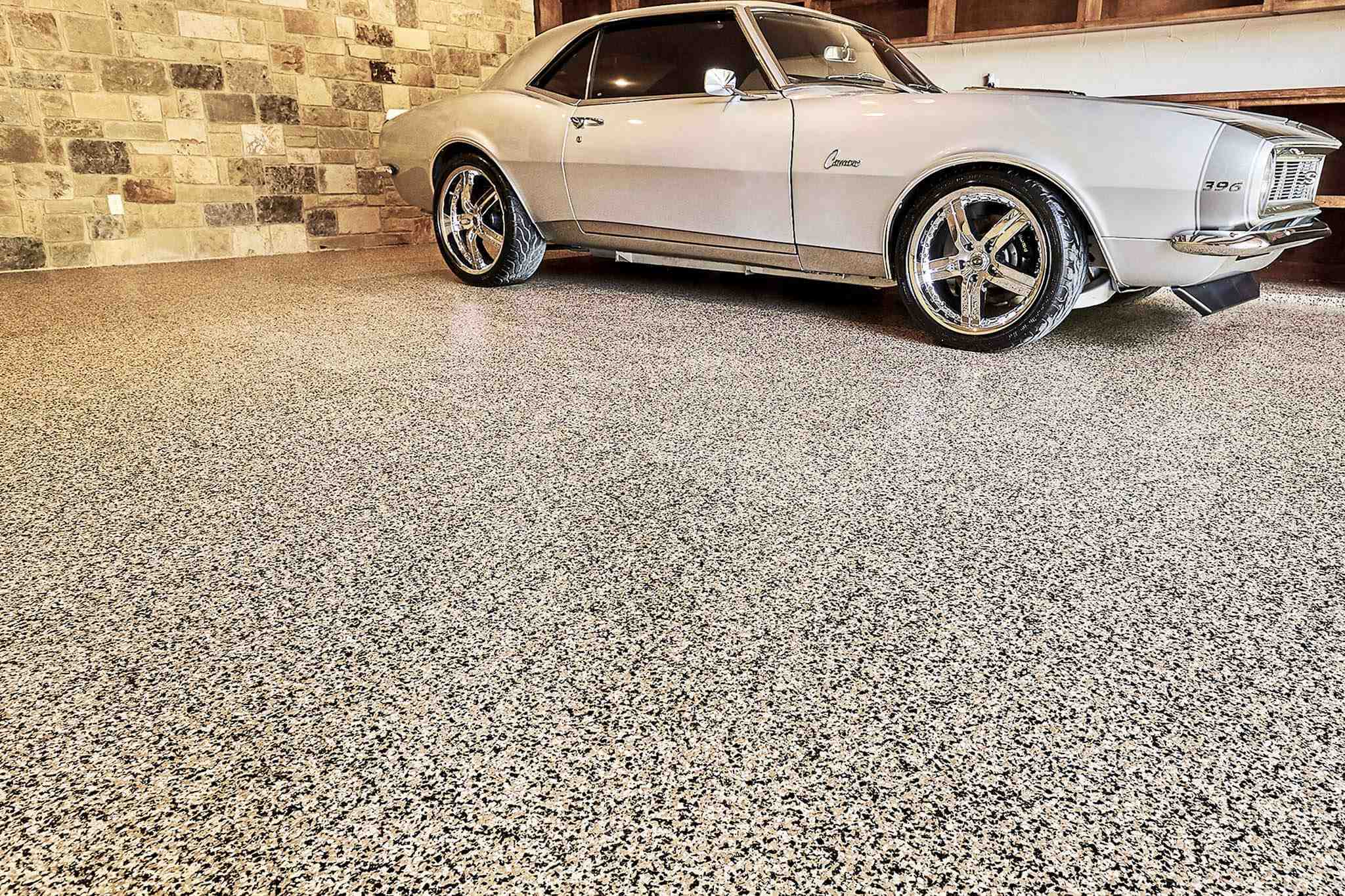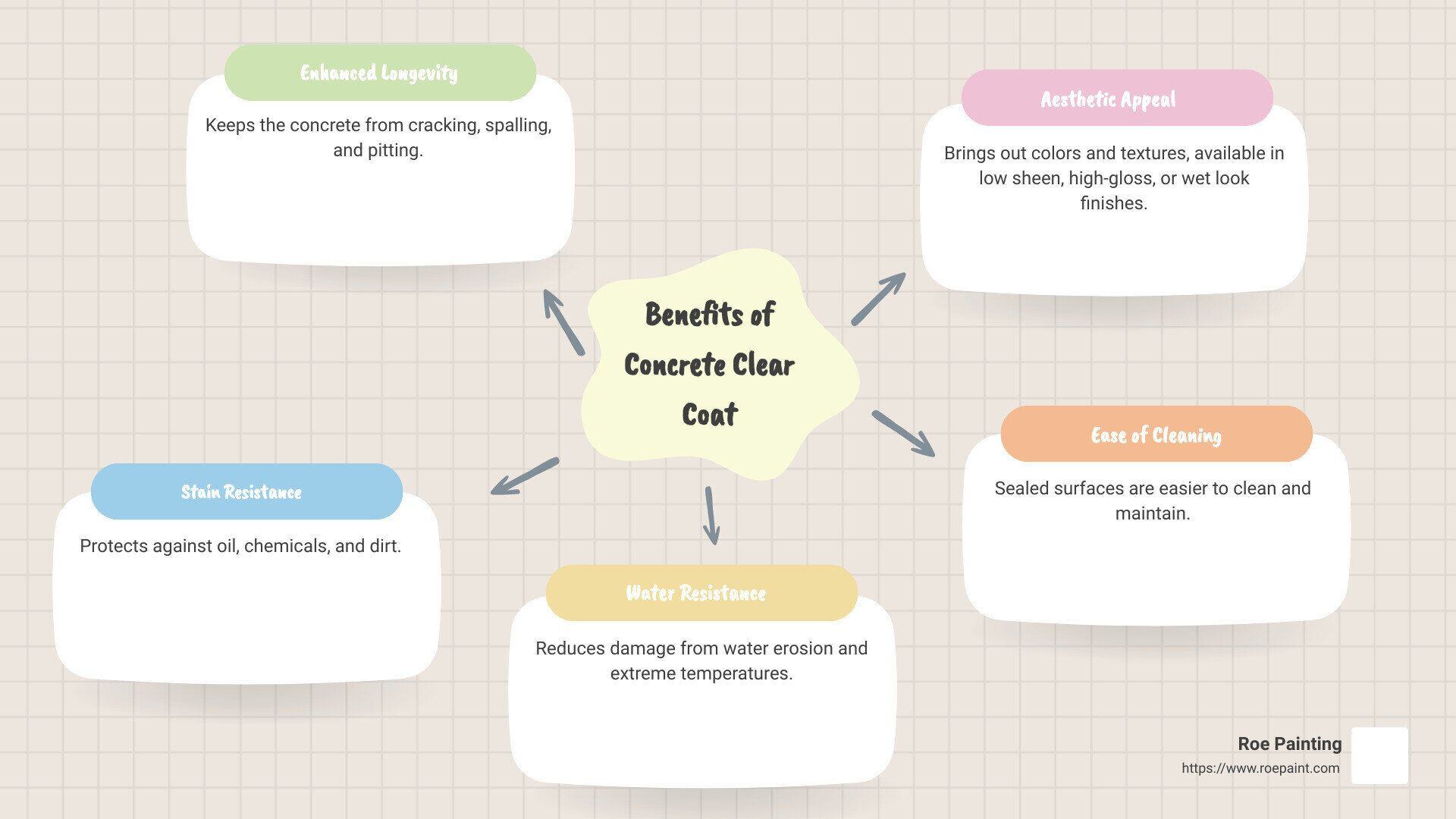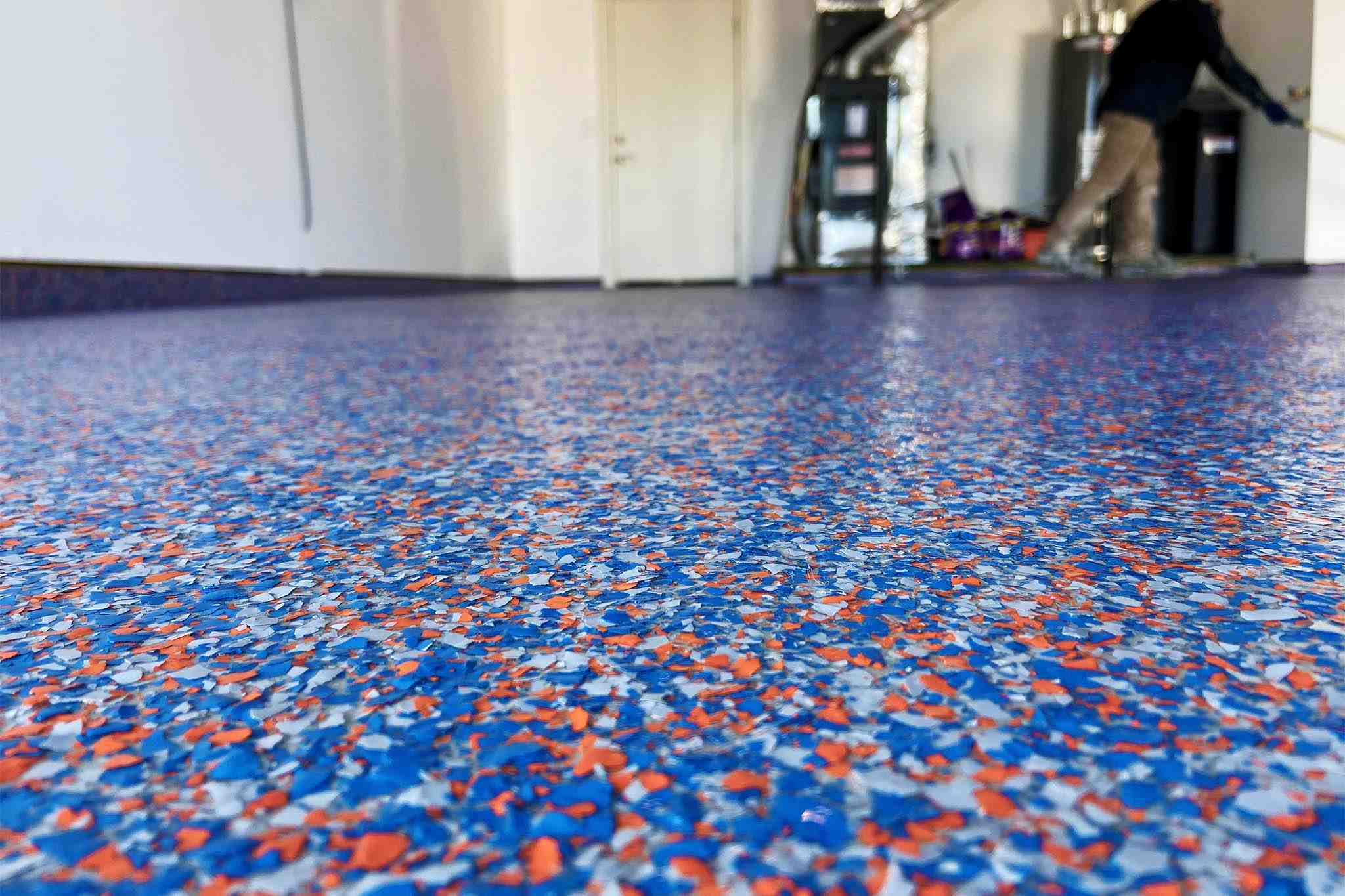Crystal Clear Choices: The Best Concrete Sealers on the Market
June 3rd, 2024
6 min read
By Jud Masters

Concrete Clear Coat: Top 5 Best Sealers for 2024
Introduction
When it comes to protecting and enhancing your concrete surfaces, a concrete clear coat is essential. Whether you own a business, are a general contractor, or a homeowner, this guide will help you choose the best clear concrete sealer for your project needs and understand its benefits.
Here’s a quick rundown of the vital advantages of using a concrete clear coat:
- Enhanced Longevity: Keeps the concrete from cracking, spalling, and pitting.
- Stain Resistance: Protects against oil, chemicals, and dirt.
- Water Resistance: Reduces damage from water erosion and extreme temperatures.
- Aesthetic Appeal: Brings out colors and textures, available in low sheen, high-gloss, or wet look finishes.
- Ease of Cleaning: Sealed surfaces are easier to clean and maintain.
A clear concrete sealer serves dual functions: protection and beautification. It stands as a shield against damaging elements and needs, extending your concrete’s service life while making it look fantastic.

Understanding Concrete Clear Coats
Types of Concrete Sealers
When it comes to concrete clear coat, there are four main types to consider: Acrylic, Penetrating, Epoxy, and Polyurethane. Each type has its own strengths and is suited for different applications.
-
Acrylic Concrete Sealer: Known for its quick dry time and color enhancement, acrylic sealers are popular for their ease of use and cost-effectiveness. They come in both water-based and solvent-based formulations. Water-based acrylics are more durable and reduce issues like brush marks and bubbling, while solvent-based versions do a better job of enhancing concrete color. However, they apply in thin coats and require frequent recoating.
-
Penetrating Concrete Sealer: Ideal for outdoor use, this type of sealer absorbs into the concrete, creating a barrier that prevents water from seeping in but allows water vapor to escape. This is crucial in winter climates to avoid freeze-thaw damage. Types include silicate, silicone, and silane sealers. Silicate increases hardness and density but offers limited water erosion protection. Silicone provides short-term protection and is often used on vertical surfaces, while silane offers heavy-duty protection and is frequently used in parking garages.
-
Epoxy Concrete Sealer: Epoxy sealers provide a thick, durable, and abrasion-resistant finish. They are highly glossy and bring out surface colors, making them a popular choice for indoor applications like kitchen counters and high-traffic walkways. However, they can yellow when exposed to UV light, so they are best suited for indoor use.
-
Polyurethane Concrete Sealer: Offering a service life of 4-8 years, polyurethane sealers provide excellent durability against chemicals, contaminants, and scuffing. They are UV stable, making them suitable for both indoor and outdoor applications. Available in water-based and solvent-based formulations, they offer flexibility and impact resistance, making them ideal for high-traffic areas.
Choosing the Right Sealer
Selecting the right concrete clear coat involves more than just picking a type. You need to consider where it will be used, the level of traffic, and your aesthetic preferences.
-
Indoor vs Outdoor: For outdoor applications, penetrating sealers and UV-stable polyurethanes are excellent choices. For indoor use, epoxy sealers provide a durable and glossy finish.
-
Traffic Levels: High-traffic areas like garages and warehouses benefit from the durability of epoxy or polyurethane sealers. For low to moderate traffic areas such as patios and driveways, acrylic or polyurethane sealers are more than sufficient.
-
Aesthetic Preferences: If you prefer a glossy finish, epoxy and polyurethane sealers are your best bet. For a more natural or matte look, acrylic sealers are ideal. Penetrating sealers maintain the natural appearance of the concrete without adding gloss.
Understanding the types of sealers and their specific uses can help you make an informed decision, ensuring your concrete surfaces are both protected and aesthetically pleasing.

Next, we will dive into the best application methods for concrete clear coats, ensuring a flawless finish every time.
How to Apply Concrete Clear Coat
Surface Preparation
Proper surface preparation is crucial for a successful concrete clear coat application. Follow these steps to ensure your surface is ready:
1. Cleaning:
– Thoroughly clean the surface: Use a broom and dustpan to remove loose debris.
– Pressure wash: For stubborn dirt and grime, a pressure washer is highly effective.
– Degreaser: If there are oil stains or grease spots, apply a degreaser to remove them.
2. Repairing:
– Patch cracks and holes: Use high-quality fillers to repair any imperfections. This helps create a smooth surface and improves adhesion.
– Fill deep cracks: For wide or deep cracks, use foam filler cord followed by liquid concrete patch. Ensure the patch is level and smooth.
3. Etching:
– Etch the surface: Use citric acid crystals mixed with water to etch the concrete. This step opens up the pores of the concrete, enhancing the bond with the clear coat.
– Safety first: Wear nitrile-coated gloves, safety goggles, and rubber boots during the etching process.
– Rinse and dry: After etching, rinse thoroughly and let the surface dry completely. Use a fan to speed up drying if necessary.
Application Techniques
Once your surface is prepped, it’s time to apply the concrete clear coat. Choose the right tools and follow these application techniques:
Tools Needed:
– Brush: For edges and corners.
– 3/8″ nap microfiber roller: For even application on large surfaces.
– Painter’s pad: For flat areas.
– Spray equipment: For quick, even coverage, especially on large surfaces.
Application Process:
1. Stir or Shake Well:
– Mix the product thoroughly: Ensure the clear coat is well-mixed for consistent application.
2. Test a Small Area:
– Conduct a test: Apply the clear coat on a small, inconspicuous area to confirm the desired appearance and adhesion.
3. Apply in Thin Layers:
– Multiple thin layers: Apply the clear coat in thin, even layers rather than one heavy layer. This prevents streaking and extends the life of the coating.
4. Adhere to Drying Times:
– Follow instructions: Allow the first coat to dry for about 2 hours before applying the second coat. Drying times may vary based on temperature and humidity.
5. Rolling:
– Use a roller: For large surfaces, a 3/8″ nap microfiber roller provides an even application. Roll in a W pattern to ensure full coverage.
6. Spraying:
– Spray application: Use airless spray equipment for quick and even coverage. This is especially useful for large areas like garages or warehouses.
7. Brushing:
– Brush for detail work: Use a brush for edges, corners, and small areas that a roller or sprayer can’t reach.
8. Protective Clear Coat:
– Consider a topcoat: After applying dyes or paints, a protective clear coat adds durability. Ensure it’s compatible with the base layer to avoid affecting the finish.
By following these preparation steps and application techniques, you can achieve a flawless and durable concrete clear coat finish.
Next, we will discuss the cost and maintenance of concrete clear coats to help you plan and maintain your project effectively.
Cost and Maintenance of Concrete Clear Coats
Cost Factors
Initial Cost:
The cost of applying a concrete clear coat varies based on several factors. Material prices range from $20 to $125 per gallon. For instance, polyurethane is among the most budget-friendly options, while epoxy sealers are on the higher end.
Surface Area:
The size of the area to be coated significantly impacts the total cost. For example, sealing a small 50-square-foot patio might cost between $100 and $150, including labor. A larger area, like a 1,000-square-foot driveway, could run between $2,000 and $3,000.
Professional vs. DIY:
Hiring a professional typically costs between $0.75 and $1.50 per square foot. This includes labor and ensures a high-quality finish.
Maintenance Practices
Cleaning:
Regular cleaning is essential to maintain the look and longevity of your concrete clear coat. Use a mild detergent and water to clean the surface. Avoid harsh chemicals that can damage the coating.
Reapplication:
Depending on the type of sealer, reapplication might be necessary. For example, epoxy coatings can last 5-10 years, while polyurethane coatings may last 4-8 years. Follow the manufacturer’s guidelines for reapplication intervals.
Damage Prevention:
Routine care can prevent damage. Sweep or vacuum the surface regularly to remove dirt and debris. This prevents scratches and keeps the coating looking fresh. If you notice any damage, such as cracks or chips, address them immediately to maintain the integrity of the surface.
By understanding these cost factors and maintenance practices, you can ensure that your concrete clear coat remains effective and attractive for years to come.
Next, we’ll answer some frequently asked questions about concrete clear coats to help you make informed decisions about your project.
Frequently Asked Questions about Concrete Clear Coat
Can Concrete Clear Coat be painted over?
Yes, once cured, you can paint over a concrete clear coat. Make sure the surface is clean and dry before applying any paint. This ensures good adhesion and a smooth finish. Proper preparation is key to a successful paint job.
How soon can Concrete Clear Coat be applied on new concrete?
Concrete clear coat can be applied to new concrete, but you need to wait at least 30 days for the concrete to cure fully. This ensures that the moisture has evaporated and the surface is ready for sealing. Applying too soon can trap moisture, leading to potential issues like bubbling or peeling.
Is Concrete Clear Coat slip-resistant?
It depends on the product. Some clear coats can become slippery when wet. However, there are additives available, like Shur Grip, that can be mixed into the sealer to provide a non-slip finish. Always check the product specifications and consider adding a grip additive if slip resistance is a concern.
Next, we’ll discuss the benefits of using Roe Painting’s concrete clear coat products and how they can enhance and protect your concrete surfaces.
Conclusion
Using a concrete clear coat is an excellent way to ensure long-term protection and aesthetic enhancement for your concrete surfaces.
Long-term Protection
A concrete clear coat acts as a shield, protecting your surfaces from damage caused by oil, chemicals, dirt, and extreme weather conditions. This is especially important for high-traffic areas like garage floors and walkways. For instance, an epoxy concrete sealer offers a thick, durable finish that resists abrasion and lasts longer compared to other sealers. This means fewer repairs and a longer lifespan for your concrete.
Aesthetic Enhancement
Beyond protection, clear coats can dramatically improve the look of your concrete. They bring out the colors and textures, giving your surfaces a polished, high-gloss, or wet look finish. Imagine your dull, grey concrete transformed into a vibrant, stylish surface that complements your home’s overall aesthetic. Whether you prefer a sleek, modern finish or a more traditional look, clear coats can deliver.
Roe Painting
At Roe Painting, we specialize in applying high-quality concrete clear coats that are tailored to meet your specific needs. Our team of experts understands the local environment and uses this knowledge to select and apply coatings that withstand Boise’s unique weather patterns. We focus on meticulous preparation and application processes to guarantee that each project is executed to the highest standard.
By choosing Roe Painting, you’re not just getting a service; you’re getting a partner committed to enhancing your living or working environment. Our concrete clear coat solutions will add both beauty and value to your property, ensuring that your investment is well-protected and visually appealing for years to come.
For more information on how we can help you with your concrete coating needs, visit our Concrete Coatings page.
Let’s transform your concrete surfaces together!
Jud has been with Roe Painting since 2017 and in the painting industry as a whole since 1999. He has a passion for estimating and selling a wide variety of painting projects. As the son of two teachers, he loves to educate his customers on what they should expect in a proper paint job. As VP of Sales, he enjoys developing estimating programs and teaching and coaching his sales team to deliver a confident contracting experience for every customer.
Topics: